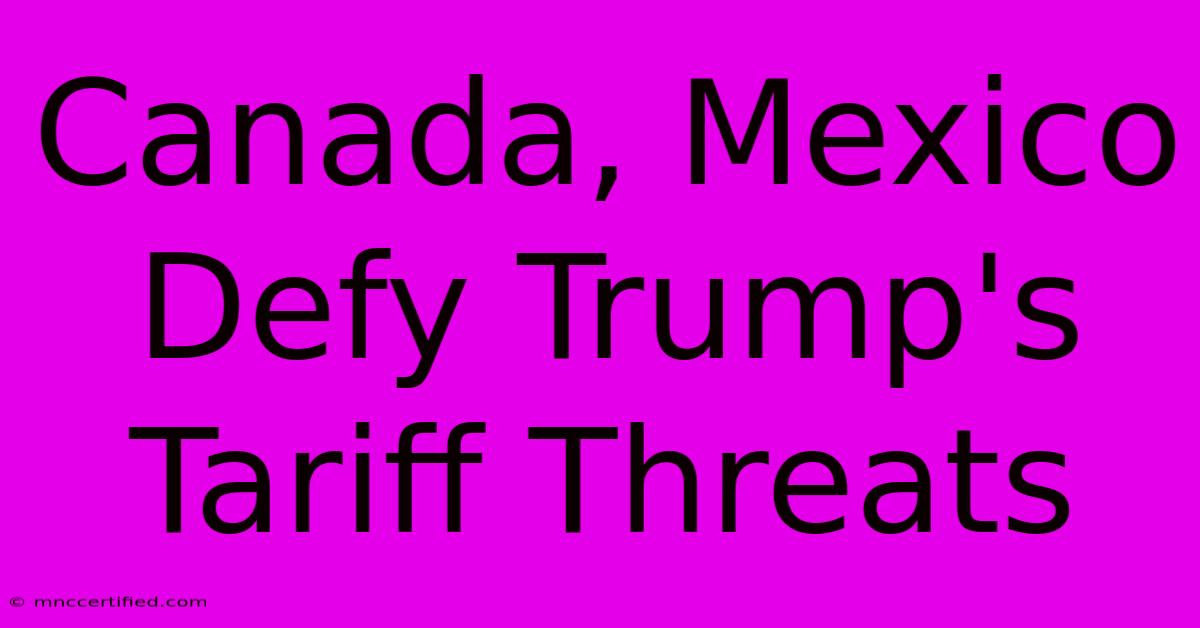Canada, Mexico Defy Trump's Tariff Threats

Table of Contents
Canada, Mexico Defy Trump's Tariff Threats: A Look Back at USMCA Negotiations
The year was 2018. Trade tensions simmered between the United States, Canada, and Mexico, fueled by then-President Trump's threats of imposing significant tariffs on imported steel and aluminum, and a complete overhaul of the North American Free Trade Agreement (NAFTA). This period marked a crucial turning point in North American trade relations, showcasing the resilience and strategic maneuvering of Canada and Mexico in the face of considerable pressure. This article delves into the events, highlighting the defiance, negotiation strategies, and the ultimate outcome – the United States-Mexico-Canada Agreement (USMCA).
Trump's Tariff Threats: A Catalyst for Change
President Trump's administration argued that NAFTA was unfair to the United States, leading to job losses and a trade deficit. His threats of imposing tariffs on Canadian and Mexican goods, including steel and aluminum – vital components in various industries – were intended to force renegotiations on more favorable terms for the US. These tariff threats weren't just empty words; they had the potential to severely disrupt established supply chains and inflict significant economic damage on all three nations.
Canada and Mexico's Response: A Show of Unity and Resolve
Instead of succumbing to pressure, Canada and Mexico presented a united front, strategically countering the threats. They employed several key strategies:
- Immediate Retaliation: Both countries swiftly announced retaliatory tariffs on various US goods, demonstrating their unwillingness to be bullied into accepting unfavorable trade deals. This action showcased their determination and sent a clear message to the Trump administration.
- International Support: Canada and Mexico actively sought support from other international organizations and trading partners, highlighting the potential negative global impact of Trump's protectionist policies. This coordinated effort helped to build international pressure on the US.
- Focused Negotiation: While pushing back against the aggressive tactics, both countries also engaged in serious negotiations, demonstrating a willingness to find common ground while safeguarding their national interests.
The Birth of USMCA: A Negotiated Victory
The initial tariff threats ultimately paved the way for the renegotiation of NAFTA, culminating in the signing of the USMCA in 2018 and its ratification in 2020. While the agreement retained many aspects of NAFTA, it also incorporated significant changes sought by the Trump administration, including:
- Increased Rules of Origin: The USMCA tightened rules of origin for automobiles, requiring a higher percentage of parts to be manufactured in North America to qualify for tariff-free trade. This was a key concession to address US concerns about manufacturing jobs moving overseas.
- Digital Trade Provisions: The agreement addressed the growing importance of digital trade, establishing rules for e-commerce and data flows.
- Labor and Environmental Provisions: The USMCA included stronger labor and environmental standards, aiming to address concerns about exploitation and environmental degradation in Mexico.
Long-Term Implications and Lessons Learned
The USMCA negotiations demonstrated the importance of strong, coordinated international relations, even amidst significant trade tensions. The defiance shown by Canada and Mexico served as a powerful example of how smaller nations can effectively push back against protectionist measures, even from larger economic powers. However, the process also highlighted the potential economic disruption that such trade disputes can cause.
The agreement itself represents a compromise, balancing the interests of all three nations while introducing adjustments to address concerns about trade imbalances and labor practices. The USMCA continues to shape North American trade relations, underscoring the ongoing need for robust negotiation and international cooperation in managing global trade. Analyzing this period provides valuable lessons in navigating complex trade negotiations and the importance of strategic alliances in the face of geopolitical pressures.
Keywords: USMCA, NAFTA, Trump tariffs, Canada, Mexico, trade negotiations, trade war, protectionism, retaliatory tariffs, North American Free Trade Agreement, United States-Mexico-Canada Agreement, rules of origin, international trade, economic relations.

Thank you for visiting our website wich cover about Canada, Mexico Defy Trump's Tariff Threats. We hope the information provided has been useful to you. Feel free to contact us if you have any questions or need further assistance. See you next time and dont miss to bookmark.
Featured Posts
-
Official Fc Barcelonas Latest Announcement
Nov 27, 2024
-
Bonnie Blues Three Words Cause This Morning Stir
Nov 27, 2024
-
Does My Insurance Cover Towing
Nov 27, 2024
-
United Security Auto Insurance
Nov 27, 2024
-
Vanderpump Rules Season 12 Cast
Nov 27, 2024